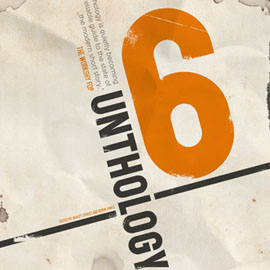You have no items in your cart. Want to get some nice things?
Go shopping
Obviously keen not to be thought of as too prescriptive in their conception of a short story collection, the team at Unthank Books have produced Unthology 6, marking a clear departure from Unthology 5. Gone is the relative thematic wholeness of the previous collection, which resulted in a series of rather anxious, dark, arguably prescient tales. Instead, Unthology 6 has range: from experimental flash fiction, with some SENTENCES IN CAPITALS and texts written in streams of uninterrupted phrases, to more traditional Checkovian stories of regretful insight and first-person narratives of loss or hope. There’s something for most reading tastes here, if little internal cohesion. That, of course, is the point, but it may slightly disappoint those expecting the same kind of thematic consistency of the previous volume (which I rather enjoyed).
Unthology 6 has a range of talent. Some stories have a clear sense of themselves as writing, as part of a tradition, whereas others are rawer, more direct. Stories such as Simon Griffiths’ Stalemate, in which an old age pensioner comes to terms with his new life, visiting Bletchley Park and overthinking his relationship with others, is wonderfully old-fashioned. It has all the joys of a straightforwardly told tale of quiet despair and new hope. It is a surprise to read that Stalemate is Griffith’s first published story, as he has an assured style and good sense of tempo. Neil Campbell’s Ceum na Caillich and James Wall’s Niagara Falls have the same kind of respect for traditional, incident-focussed narrative, in which characters come to new, ‘wiser-if-sadder’ understandings of their lot.
On the other hand, there are stories which read as though they’ve been lifted directly out of the writer’s brain. The best of these is Daisy Lafarge’s Egor, although Tim Sykes comes a close second in his apparently normal, but ultimately striking story of a famous artist’s death in Everything Changes, Nothing Perishes. In Lafarge’s Egor, a young woman meets a Russian artist at an art gallery exhibition. There is some attempt at romance, nervously on his part, half-heartedly but curiously on hers. The woman throws hard-hearted comments around (at least on the page, and mostly for her own amusement, or perhaps in order to shock herself out of a kind of spiritual lethargy).
The man asks me when I will be free. I give him my email address. I am not attracted to him but bored and lonely and only here by accident. I have had little opportunity to behave in a way that conveys ‘fuck it’ so I leave, vanity stroked for the first time in months, apathetic about seeing the man but pleased that something unplanned has managed to penetrate the day.
The tone and the sentiment is reminiscent of those expressed by Grigori Pechorin in Mikhail Lermontov’s A Hero of Our Time (1840), though Lafarge seems to write without obvious homage to any existing writer (still, it’s hard to think she doesn’t know Lermontov, though I could be wrong). For me, Egor was the overall standout story in the collection. It engenders a picture of an outwardly polite, reticent and attentive young woman, who nonetheless thinks quite cynically.
There are a number of grimly comic stories. In Alexandros Plasatis’ The Story with Yuliya Has a Bad Ending, an Egyptian man goes to a bar and verbally accosts the barman, telling him a convoluted story, at top volume, about a bullet-speed drive through Greece to see his not-quite-girlfriend Yuliya. Quickly, it becomes clear that any meeting with Rasool is best avoided:
‘What are you doing Rasool?’
‘I forgot the cat in the freezer.’
‘What cat?’
‘I put a cat in the freezer. I must get her out of there.’
‘Please don’t talk like that, Rasool. Please, you scare us.’
‘You don’t need to be scared, sweeties…I put a little cat in the freezer because she annoyed me. I’ve got to get her out.’
‘Oh, don’t talk like that, Rasool…’
The story has a zany energy, even joy, though it strays into dark territory. The same kind of ostentatious strangeness comes through in Gordon Collins’ Psycho-Nasal Aggravation Syndrome, in which the main character is, not a man with a nose, but one with ‘a cascade of thick glossy hairs flowing from the middle of his face.’ There’s something about both of these stories which would make them best read out loud, for others to enjoy their ‘oh-my-god-what’s-going-to-happen-next’-ness.
Other stories, however, would be best whispered, or thought only. Robert Anthony’s Shadows, Roelof Bakker’s Blue and Victoria Hattersley’s The Girl have such an insidious power. In the first of these, Shadows, the narrator speaks of a married man coming home to dinner. The narrator seems normal enough, speaking with a kind of seasoned discretion, before suddenly, and as deceptively quiet as before, saying something rather less common.
He went home. His wife was waiting there, cooking a dead animal in a pot. She’d added: cumin, garlic, ginger, yogurt, coriander, and a lot of other things. The main ingredients of the dish were the animal’s flesh, the animal’s bones, onions, the spices mentioned above, and death. Death was the secret ingredient.
Shadows has an inexorable drive towards a fateful ending, which yet surprises due to its apparent ordinariness. The shadow-haunted man is so far wrapped up, sunk into or struck by his new world, that he seems to have forgotten another life ever existed.
Unthology 6 is best read casually: pick it up once in a while and see what you make of it. There are stories to be struck by, to think over or to laugh with. The slight frustration (it’s probably not fair to say this, but you can’t love reading without forever thinking of the best writers – personally, I pick up every new book knowing, at least in some small way, that it won’t be Dostoevsky) is that there are few attempts by the seventeen writers to stand out for their linguistic skill or wit. Some sentences here and there become quotable, but it seems the main, collective intention was to present a narrative, a character, a mood or an insight. It does not come as a surprise to learn that the main exception, Daisy Lafarge, also writes poetry: she seems to take the most pleasure in thinking through words. Pick up a copy of Unthology 6 and see for yourself: there’s bound to be something for you to enjoy.

About Andre van Loon
Andre van Loon is a freelance literary critic, specialising in new British and American novels and studies of Russian nineteenth century literature. He holds an MA in English Literature & Russian Studies from the University of Edinburgh and lives in London.




